- Home
- Connie Willis
Blackout
Blackout Read online
ALSO BY CONNIE WILLIS
Lincoln’s Dreams
Doomsday Book
Impossible Things
Uncharted Territory
Remake
Bellwether
Fire Watch
To Say Nothing of the Dog
Miracle and Other Christmas Stories
Passage
To Courtney and Cordelia,
who always do far more
than their bit.
History is now and England.
—T. S. ELIOT, FOUR QUARTETS
ACKNOWLEDGMENTS
I want to say thank you to all the people who helped me and stood by me with Blackout as it morphed from one book into two and I went slowly mad under the strain: my incredibly patient editor, Anne Groell, and my long-suffering agent, Ralph Vicinanza; my even longer-suffering secretary, Laura Lewis; my daughter and chief confidante Cordelia; my family and friends; every librarian within a hundred-mile radius; and the baristas at Margie’s, Starbucks, and the UNC student union who gave me tea—well, chai—and sympathy on a daily basis. Thank you all for putting up with me, standing by me, and not giving up on me or the book. But most especially, I want to thank the marvelous group of ladies at the Imperial War Museum the day I was there doing research—women who, it turned out, had all been rescue workers and ambulance drivers and air-raid wardens during the Blitz, and who told me story after story that proved invaluable to the book and to my understanding of the bravery, determination, and humor of the British people as they faced down Hitler. And I want to thank my wonderful husband, who found them, sat them down, bought them tea and cakes, and then came to find me so I could interview them. Best husband ever!
Come then: Let us to the task, to the battle, to the toil—each to our part, each to our station, there is not a week, nor a day, nor an hour to lose.
—WINSTON CHURCHILL, 1940
Oxford—April 2060
COLIN TRIED THE DOOR, BUT IT WAS LOCKED. THE PORTER, Mr. Purdy, obviously hadn’t known what he was talking about when he’d said Mr. Dunworthy had gone to Research. Blast it. I should have known he wasn’t here, Colin thought. Only historians prepping for assignments came to Research. Perhaps Mr. Dunworthy’d told Mr. Purdy he was going to do research, in which case he’d be in the Bodleian Library.
Colin went over to the Bodleian, but Mr. Dunworthy wasn’t there either. I’ll have to go ask his secretary, Colin thought, loping back to Balliol. He wished Finch was still Mr. Dunworthy’s secretary instead of this new person Eddritch, who would probably ask a lot of questions. Finch wouldn’t have asked any, and he’d have not only told him where Mr. Dunworthy was, but what sort of mood he was in.
Colin ran up to Mr. Dunworthy’s rooms first, on the off chance Mr. Purdy hadn’t seen Mr. Dunworthy come back in, but he wasn’t there either. Then he ran across to Beard, up the stairs, and into the outer office. “I need to see Mr. Dunworthy,” he said. “It’s important. Can you tell me where—?”
Eddritch looked at him coldly. “Did you have an appointment, Mr.—?”
“Templer,” Colin said. “No, I—”
“Are you an undergraduate here at Balliol?”
Colin debated saying yes, but Eddritch was the sort who would check to see if he was. “No, I will be next year.”
“If you’re applying to be a student at Oxford, you need the Provost’s Office in Longwall Street.”
“I’m not applying to be a student. I’m a friend of Mr. Dunworthy’s—”
“Oh, Mr. Dunworthy has told me about you.” He frowned. “I thought you were at Eton.”
“We’re on holiday,” Colin lied. “It’s vital that I see Mr. Dunworthy. If you could tell me where he—”
“What did you wish to see him about?”
My future, Colin thought. And it’s none of your business, but that obviously wouldn’t get him anywhere. “It’s in regard to an historical assignment. It’s urgent. If you could just tell me where he is, I—” he began, but Eddritch had already opened the appointment book. “Mr. Dunworthy can’t see you until the end of next week.”
Which will be too late. Blast, I need to see him now, before Polly comes back.
“I can give you an appointment at one o’clock on the nineteenth,” Eddritch was saying. “Or at half past nine on the twenty-eighth.”
What part of the word “urgent” do you not understand? Colin thought. “Never mind,” he said and went back downstairs and out to the gate to see if he could get any more information out of Mr. Purdy. “Are you certain Research was where he said he was going?” he asked the porter, and when he said yes, “Did he say where he was going after that?”
“No. You might try the lab. He’s been spending a good deal of time there these past few days. Or if he’s not there, Mr. Chaudhuri may know where he is.”
And if he’s not there I can ask Badri when Polly’s scheduled to come back. “I’ll try the lab,” Colin said, debating whether to ask him to tell Mr. Dunworthy he was looking for him if he returned. No, better not. Forewarned was forearmed. He’d have a better chance if he sprang it on him suddenly. “Thanks,” he said and ran down to the High and over to the lab.
Mr. Dunworthy wasn’t there. The only two people who were were Badri and a pretty tech who didn’t look any older than the girls at school. They were both bent over the console. “I need the coordinates for October fourth, 1950,” Badri said. “And—what are you doing here, Colin? Aren’t you supposed to be at school?”
Why was everyone acting like a truant officer?
“You haven’t been sent down, have you?”
“No.” Not if they don’t catch me. “School holiday.”
“If you’re here to talk me into letting you go to the Crusades, the answer is no.”
“The Crusades?” Colin said. “That was years ago—”
“Does Mr. Dunworthy know you’re here?” Badri asked.
“Actually, I’m looking for him. The porter at Balliol told me he might be here.”
“He was,” the tech said. “You only just missed him.”
“Do you know where he was going?”
“No. You might try Wardrobe.”
“Wardrobe?” First Research and now Wardrobe. Mr. Dunworthy was obviously going somewhere. “Where is he going? St. Paul’s?”
“Yes,” the tech said. “He’s researching—”
“Linna, I need those coordinates,” Badri said, glaring at her. The tech nodded and went over to the other side of the lab.
“He’s going to St. Paul’s to rescue the treasures, isn’t he?” Colin asked Badri.
“Mr. Dunworthy’s secretary should know where he is,” Badri said and walked back to the console. “Why don’t you go over to Balliol and ask him?”
“I did. He wouldn’t tell me anything.”
And Badri clearly didn’t want to either. “Colin,” he said, “we’re very busy here.”
The tech, Linna, who’d come back with the coordinates, nodded. “We have three retrievals and two drops to do this afternoon.”
“Is that what you’re doing now?” Colin asked, walking over to look at the draped folds of the net. “A drop?”
Badri immediately came over and blocked his way. “Colin, if you’re here to attempt to—”
“Attempt to what? You act as if I’m planning to sneak into the net or something.”
“It wouldn’t be the first time.”
“And if I hadn’t, Mr. Dunworthy would have died, and so would Kivrin Engle.”
“That may be the case, but it doesn’t mean you can make a habit of it.”
“I wasn’t. All I wanted—”
“Was to know if Mr. Dunworthy was here. He’s not, and Linna and I are extremely busy,” Badri said. “So if there’s nothing else—”
> “There is. I need to know when Polly Churchill’s retrieval is scheduled for.”
“Polly Churchill?” Badri said, immediately suspicious. “Why are you interested in Polly Churchill?”
“I’ve been helping her with her prep research. For the Blitz. I need to be here when she comes through to—” He began to say, “to give it to her,” but Badri was likely to tell him to leave it instead and they’d give it to her. “—to tell her what I’ve found,” he amended.
“We haven’t scheduled her retrieval yet,” Badri said.
“Oh. Is she going straight to her Blitz assignment when she gets back?”
Linna shook her head. “We still haven’t found her a drop site—” she began, but Badri cut her off with another glare.
“It isn’t going to be flash-time, too, is it?”
“No, real-time,” Badri said. “Colin, we’re extremely busy.”
“I know, I know. I’m going. If you see Mr. Dunworthy, tell him I’m looking for him.”
“Linna, see Colin out,” Badri said, “and then bring me the spatial-temporal coordinates for Pearl Harbor on December sixth, 1941.”
Linna nodded and escorted Colin to the door. “Sorry. Badri’s been in a foul mood this past fortnight,” she whispered. “Polly Churchill’s retrieval is scheduled for two o’clock Wednesday next.”
“Thanks,” Colin whispered back, grinned crookedly at her, and ducked out the door. Wednesday. He’d hoped it would be on the weekend so he wouldn’t have to sneak away from school again, but at least it wasn’t this Wednesday. He had over a week to talk Mr. Dunworthy into letting him go somewhere. If Mr. Dunworthy was going to rescue the treasures, Colin might be able to talk him into doing research in the past for him. If he was still at Wardrobe. He loped over to the Broad, down to Holywell, along the narrow street to Wardrobe, and up the stairs, hoping he hadn’t missed him again.
He hadn’t. Mr. Dunworthy was standing in front of the mirror in a tweed blazer at least four sizes too large for him, and glaring at the cowering tech. “But the only tweed jacket we had in your size has already been taken in to fit Gerald Phipps,” she was saying. “He had to have a tweed jacket because he’s going to—”
“I know where he’s going,” Mr. Dunworthy bellowed. He suddenly noticed Colin. “What are you doing here?”
“Wearing clothes that fit a good deal better than that,” Colin said, grinning. “Is that how you’re planning to smuggle the treasures out of St. Paul’s—under your coat?”
Mr. Dunworthy shrugged out of the jacket, said, “Find me something in my size,” and half threw it at the tech, who scurried off with it.
“I think you should have kept it,” Colin said. “You’d be able to fit The Light of the World and Newton’s tomb under there.”
“Sir Isaac Newton’s tomb is in Westminster Abbey. Lord Nelson’s tomb is in St. Paul’s,” Mr. Dunworthy said. “Which you would know if you spent more time at school, where you are supposed to be at this very moment. Why aren’t you?”
He would never buy the holiday story. “A water main broke,” Colin said, “and they had to cancel classes for the rest of the day, so I thought I’d take the opportunity to come see what you were up to. And a good thing, too, since you’re obviously haring off to St. Paul’s.”
“Water main,” Mr. Dunworthy said dubiously.
“Yes. Flooded my house and half the quad. We nearly had to swim for it.”
“Odd your housemaster didn’t mention it when Eddritch telephoned him.”
I knew I didn’t like Eddritch, Colin thought.
“He did, however, mention your repeated absences. And the failing mark you got on your last essay.”
“That’s because Beeson made me write it on this book, The Impending Threat of Time Travel, and it was total rubbish. It said time travel theory’s rot, and historians do affect events, that they’ve been affecting them all along, but we haven’t been able to see it yet because the space-time continuum’s been able to cancel out the changes. But it won’t be able to forever, so we need to stop sending historians to the past immediately and—”
“I am fully acquainted with Dr. Ishiwaka’s theories.”
“Then you know it’s bollocks. All I did was say so in my essay, and Beeson gave me a failing mark! It’s totally unfair. I mean, Ishiwaka says these ridiculous things, like slippage isn’t to stop historians from going to times and places where they’ll affect events at all. He says it’s a symptom that something’s wrong, like a fever in a patient with an infection, and that the amount of slippage will grow larger as the infection gets worse, but we won’t be able to see that either, because it’s exponential or something, so there’s no proof of any of this, but we should still stop sending historians because by the time we do have proof, it’ll be too late and there won’t be any time travel. It’s total rubbish!” Mr. Dunworthy was frowning. “Well, don’t you think it is?”
Dunworthy didn’t answer.
“Well, don’t you?” Colin asked, and when he still stood there, “You can’t mean you believe his theory? Mr. Dunworthy?”
“What? No. As you say, Dr. Ishiwaka hasn’t been able to produce convincing proof of his ideas. On the other hand, he raises some troubling questions that require investigation, not a dismissal as ‘total rubbish.’ But you obviously didn’t come up here to debate time travel theories with me. Or to, as you put it, see what I was up to.” He looked shrewdly at Colin. “Why did you come?”
Here was where it got tricky. “Because I’m wasting my time studying maths and Latin. I want to be studying history, and not dry-as-dust books—the real thing. I want to go on assignment. And don’t say I’m too young. I was twelve when we went to the Black Death. And Jack Cargreaves was seventeen when he went to Mars.”
“And Lady Jane Grey was seventeen when she was beheaded,” Mr. Dunworthy said, “and being an historian is even more dangerous than being a pretender to the throne. There are all sorts of risks involved, which is why historians—”
“—have to be third-year students and at least twenty years old before they can go to the past,” Colin recited. “I know all that. But I’ve already been to the past. To a ten. It can’t get more dangerous than that. And there are all sorts of assignments where someone my age—”
Mr. Dunworthy wasn’t listening. He was staring at the tech, who’d come in carrying a black leather jacket covered with metallic slide fasteners. “What exactly is that?” he demanded.
“A motorcycle jacket. You said something in your size,” she added defensively. “It’s from the correct historical era.”
“Miss Moss,” Mr. Dunworthy said in the tone that always made Colin wince, “the entire point of an historian’s costume is that of camouflage—to keep from drawing attention to himself. To blend in. How do you expect me to do that,” he gestured at the leather jacket, “dressed in that?”
“But we have photographs of a jacket like this from 1950…” the tech began and then thought better of it. “I’ll see what else I’ve got.” She retreated, wincing, into the workroom.
“In tweed,” Mr. Dunworthy called after her.
“Blending in is exactly what I’m talking about,” Colin said. “There are all sorts of historical events where a seventeen-year-old would blend in perfectly.”
“Like the Warsaw ghetto?” Mr. Dunworthy said dryly. “Or the Crusades?”
“I haven’t wanted to go to the Crusades since I was twelve. That’s exactly what I’m talking about. Both you and—” He caught himself. “You and everyone at school still think of me as a child,” he said instead, “but I’m not. I’m nearly eighteen. And there are all sorts of assignments I could be doing. Like al-Qaeda’s second attack on New York.”
“New—?”
“Yes, there was a high school near the World Trade Center. I could pose as a student and see the entire thing.”
“I am not sending you to the World Trade Center.”
“Not to it. The school was four blocks away,
and none of the students got killed. No one was even injured, except for the toxins and asbestos they inhaled, and I could—”
“I am not sending you anywhere near the World Trade Center. It’s far too dangerous. You could be killed—”
“Well, then send me somewhere that isn’t dangerous. Send me to 1939, to the Phoney War. Or to the north of England to observe the evacuated children.”
“I am not sending you to World War II either.”
“You went to the Blitz, and you let Polly—”
“Polly?” Mr. Dunworthy said alertly. “Polly Churchill? What does she have to do with this?”
Bollocks. “Nothing. Just that you let your historians go all sorts of dangerous places, and you go all sorts of dangerous places, and you won’t even let me go to the north of England, which wouldn’t be dangerous at all. The government evacuated the children there to be out of danger. I could pretend to be taking my younger brothers and sisters—”
“I already have an historian in 1940 observing the evacuated children.”
“But not in 1942 through 1945. I looked it up, and some of the children stayed in the country for the entire war. I could observe the effect that being separated from their parents that long had on them. And my missing school needn’t be a problem. I could do it flash-time and—”
“Why are you so set on going to World War II? Is it because Polly Churchill’s there?”
“I’m not set on going to World War II. I only suggested it because you didn’t want me to go anywhere dangerous. And you’re a fine one to talk about danger when you’re going to St. Paul’s the night before the pinpoint bomb—”
Mr. Dunworthy looked astonished. “The night before the pinpoint bomb? What are you talking about?”
“Your rescuing the treasures.”
“Who told you I was rescuing St. Paul’s treasures?”
“No one, but it’s obvious that’s why you’re going to St. Paul’s.”
“I am not—”
“Well, then, you’re going to go see what’s there so you can rescue them later. I think you should take me with you. You need me. You’d have died if I hadn’t gone with you to 1349. I can pose as a university student studying Nelson’s tomb or something and make a list of all the treasures for you.”

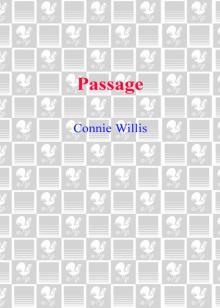 Passage
Passage Bellwether
Bellwether Blackout
Blackout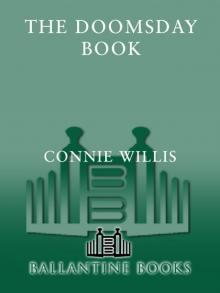 Doomsday Book
Doomsday Book A Lot Like Christmas: Stories
A Lot Like Christmas: Stories Water Witch
Water Witch To Say Nothing of the Dog
To Say Nothing of the Dog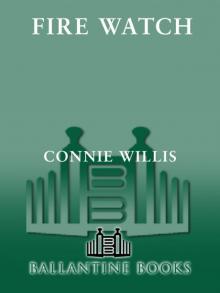 Fire Watch
Fire Watch The Winds of Marble Arch and Other Stories
The Winds of Marble Arch and Other Stories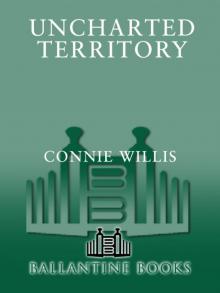 Uncharted Territory
Uncharted Territory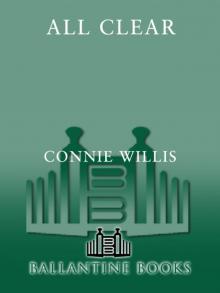 All Clear
All Clear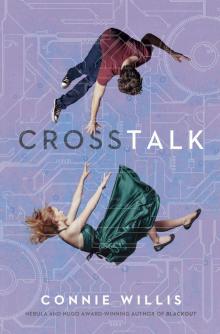 Crosstalk
Crosstalk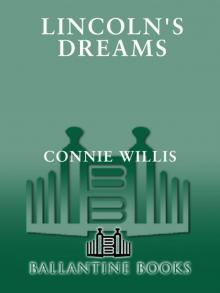 Lincoln's Dreams
Lincoln's Dreams Miracle and Other Christmas Stories
Miracle and Other Christmas Stories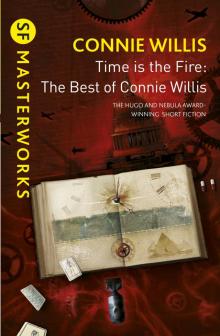 Time is the Fire
Time is the Fire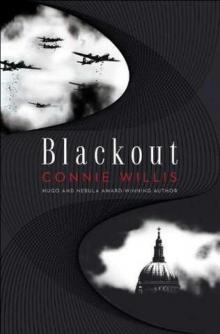 Blackout ac-1
Blackout ac-1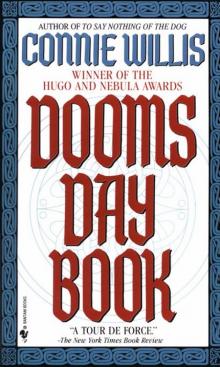 Dooms Day Book
Dooms Day Book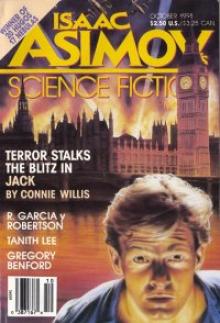 Jack
Jack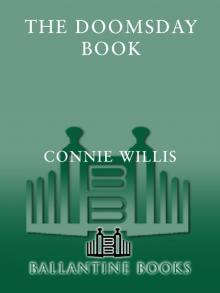 The Doomsday Book
The Doomsday Book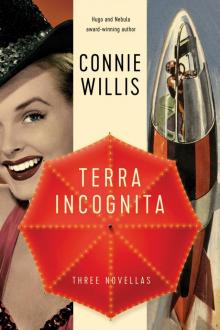 Terra Incognita
Terra Incognita The Best of Connie Willis
The Best of Connie Willis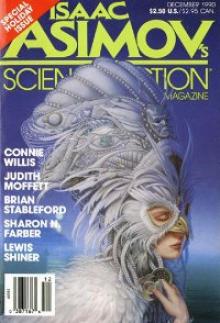 Cibola
Cibola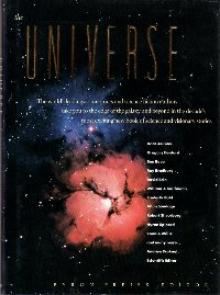 Schwarzschild Radius
Schwarzschild Radius Even the Queen
Even the Queen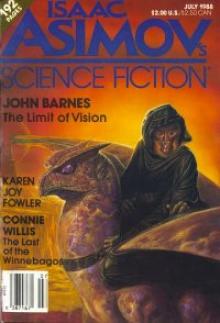 The Last of the Winnebagos
The Last of the Winnebagos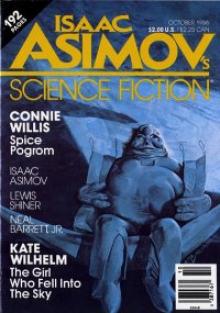 Spice Pogrom
Spice Pogrom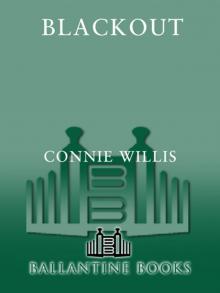 Oxford Time Travel 1 - Blackout
Oxford Time Travel 1 - Blackout At The Rialto
At The Rialto A Lot Like Christmas
A Lot Like Christmas